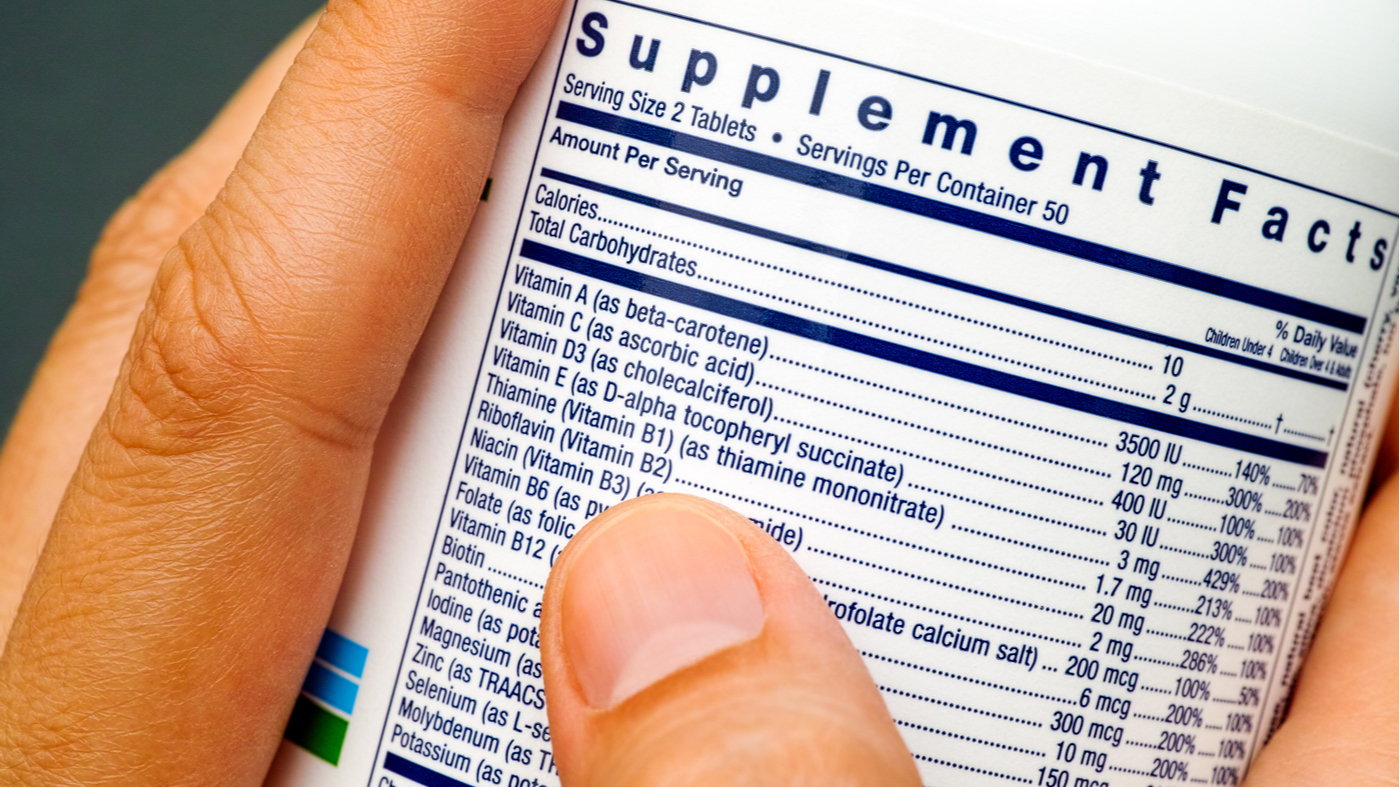
White Plains, New York, February 12, 2021 — It took almost four years, but more accurate labels on vitamin and mineral supplements are finally here and consumers should not be surprised to see changes, says Tod Cooperman, M.D., president and founder of ConsumerLab.com, which has been testing and reporting about dietary supplements since 1999. Even if the product formulas have not changed, labels will show changes in the "% DV" (percent of the Daily Value) for 20 vitamins and minerals and in the units of measurement for vitamins A, D, and E and folate (vitamin B9), moving away, for example, from IUs (International Units) and toward milligram (mg) and microgram (mcg) weights.
The changes may be particularly noticeable on labels of multivitamins, B vitamin complexes, and single vitamins and minerals.
The FDA had, in July of 2016, updated the Daily Values (the amounts needed by most people) as part of the agency's revised rules for nutrient and supplement facts labeling. However, the FDA gave large manufacturers until January 1st of 2020 to implement these changes and it gave small companies an extra year. By now, all supplement manufacturers must comply with the new labeling.
"It has been a long time coming, but these new DVs are a huge improvement over the previous DVs set in 1968 and will help consumers get what they really need," said Dr. Cooperman.
In order to help consumers look up their own daily nutritional requirements, ConsumerLab.com has published the new DVs, as well as RDAs (Recommended Daily Allowances) and ULs (Tolerable Upper Intake Levels) on its Recommended Daily Intakes and Upper Limits for Vitamins and Minerals page, which is freely available to the public.
The revised rules increased, decreased or established DVs for the following vitamins and minerals for adults and children age 4 or older including the following:
- Magnesium increased from 400 mg to 420 mg
- Manganese increased from 2 mg to 2.3 mg
- Phosphorus increased from 1,000 mg to 1,250 mg
- Potassium increased from 3,500 mg to 4,700 mg
- Calcium increased from 1,000 mg to 1,300 mg
- Vitamin C increased from 60 mg to 90 mg
- Vitamin K increased from 80 mcg to 120 mcg
- Vitamin D increased from 400 IU (10 mcg) to 800 IU (20 mcg)
- Chloride decreased from 3,400 mg to 2,300 mg
- Chromium decreased from 120 mcg to 35 mcg
- Copper decreased from 2 mg to 0.9 mg
- Molybdenum decreased from 75 mcg to 45 mcg
- Zinc decreased from 15 mg to 11 mg
- Thiamin decreased from 1.5 mg to 1.2 mg
- Riboflavin decreased from 1.7 mg to 1.3 mg
- Niacin decreased from 20 mg to 16 mg
- Vitamin B-6 decreased from 2 mg to 1.7 mg
- Vitamin B-12 decreased from 6 mcg to 2.4 mcg
- Biotin decreased from 300 mcg to 30 mcg
- Pantothenic acid decreased from 10 mg to 5 mg
- A DV for choline was established the first time, at 550 mg
In addition, DVs were established for infants, children ages 1 to 3 years, and pregnant or lactating women.
Other notable changes include:
- Vitamin A and vitamin C are no longer required to be listed on food labels, although manufacturers can voluntarily do so.
- Vitamin D and potassium are now required to be listed on food labels.
- Amounts of vitamin A, vitamin D and vitamin E are now required to be listed in units of micrograms (mcg) or milligrams (mg) rather than the international units (IU) which consumers may be accustomed to seeing on food and supplement labels. Vitamin A will be listed as mcg of retinol activity equivalents (RAE), vitamin D as mcg, and vitamin E as mg a-tocopherol.
- Folate must be declared in terms of mcg of "dietary folate equivalents" (DFE) rather than mcg. This is important because synthetic forms of folate, such as folic acid, are equivalent to about 1.67 times that of naturally-occurring folate. This means that a product currently labeled to contain 400 mcg of folic acid and 100% of the adult DV, will be relabeled to show 667 mcg DFE of folate and 167% of the DV. (Be aware that the Tolerable Upper Intake Level (UL) for folate is not based on DFE, but microgram amounts of synthetic forms of folate such as folic acid and methylfolate). "Folacin" is no longer permitted as a synonym for "folic acid" on nutrition and supplement facts labels.
Founded in 1999, ConsumerLab.com is a leading provider of consumer information and independent evaluations of products that affect health and nutrition. Membership to ConsumerLab.com is available online and provides immediate access to continually updated reviews of nearly every popular type of dietary supplement and health food, answers to reader questions, and product recalls and warnings. ConsumerLab also provides independent product testing through its voluntary Quality Certification Program. The company is privately held and based in New York. It has no ownership from, or interest in, companies that manufacture, distribute, or sell consumer products.
Members of the media contact may contact media@consumerlab.com or call the ConsumerLab.com main number (914-722-9149). Please include the name of your news organization when contacting us.





